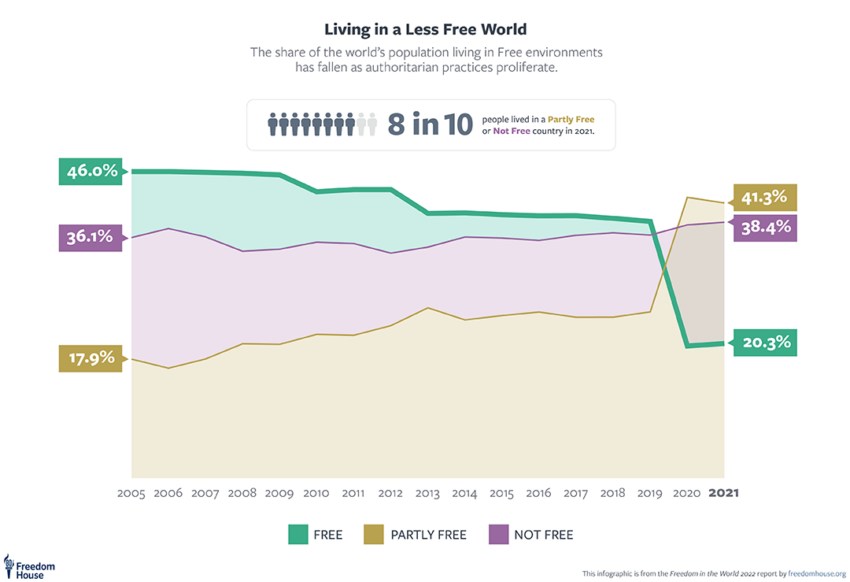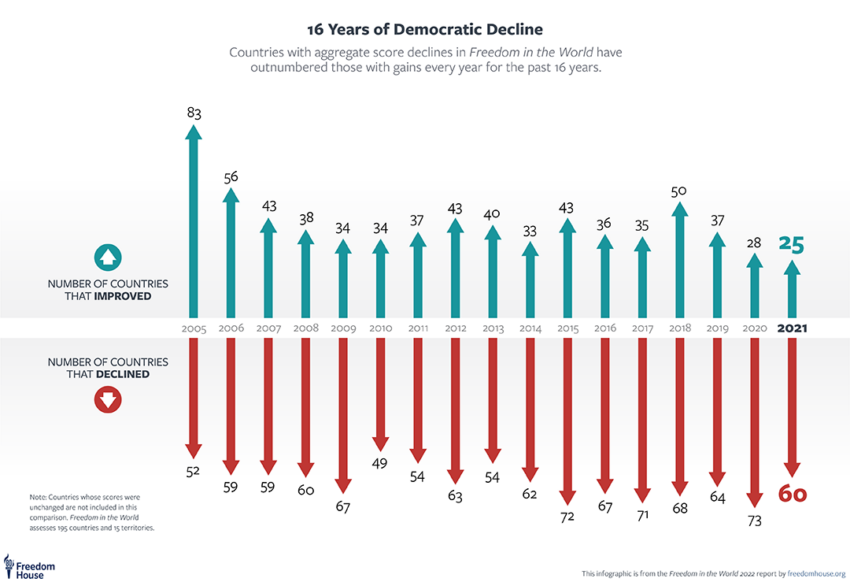Blockchain
In an era where democracy is under siege, the search for a secure and trustworthy voting system has never been more urgent. Enter blockchain technology, with its potential to revolutionize the way we vote and safeguard the democratic process.
But as we delve into the pros and cons of this emerging technology, one must ask: Can blockchain truly help secure democracy? Let’s explore the possibilities, challenges, and real-world examples of implementing blockchain in the electoral process.
Authoritarianism and the Promise of Blockchain Voting
As authoritarianism surges in countries like Brazil, Turkey, and, some say, the United States, democracy faces unprecedented challenges. Accurate and transparent voting is crucial for maintaining democratic values.
Blockchain technology offers a potential solution for secure, tamper-proof voting. Despite verified results, around 40% of Americans believe the last presidential election was “stolen,” raising questions about the technology’s effectiveness in ensuring electoral trust.
Not all US voters in 2020 credited the results of the elections, but remote voting still has unexplored potential.
The Promise of Blockchain
Blockchain voting guarantees transparency and integrity in the election process. By recording each vote as an encrypted transaction on a decentralized ledger, blockchain ensures votes are irreversible, traceable, and auditable. This prevents tampering and strengthens the credibility of the process.
Moreover, blockchain voting systems can use smart contracts to automate various election tasks, such as voter registration, vote tallying, and result declaration, further bolstering trust in the system. Furthermore, blockchain-based voting systems can allow for third-party audits, providing even more transparency to the electoral process.
Utilizing decentralized and encrypted ledgers, blockchain significantly diminishes the risks of voter fraud and hacking. The decentralized nature of blockchain systems makes it difficult for malicious actors to manipulate the system. Each node in the network verifies transactions, making it nearly impossible for unauthorized access or data modification to go unnoticed.
The use of cryptographic signatures can ensure that only eligible voters can cast their votes, preventing potential fraud. Additionally, a distributed denial-of-service (DDoS) attack, which is a common threat to traditional voting systems, would be less effective against a decentralized system.
Remote and secure voting options can increase voter turnout by removing geographical barriers and making the process more accessible. Blockchain technology enables secure remote voting from anywhere, potentially benefiting those with disabilities, remote workers, and citizens living abroad.
By streamlining the voting process and reducing reliance on manual procedures, blockchain could also expedite vote counting and result declaration. This can lead to a more efficient electoral process, even reducing the time it takes for results to be announced.
The Drawbacks of Blockchain
Blockchain voting isn’t immune to errors and problems. For instance, a 51% attack occurs when a single entity or group gains control of over 50% of the network’s computing power, potentially enabling it to manipulate the ledger. Furthermore, collusion among participants in the network may also compromise election outcomes.
Voter coercion, wherein individuals are forced to vote a certain way, could persist in a blockchain voting system, ruining the election’s legitimacy. New security measures, such as secure cryptographic protocols, may need to be developed to protect against these threats.
Scalability is another challenge for blockchain voting systems. As the number of voters and transactions increases, the system’s capacity may become strained, resulting in slow transaction times and higher costs. Developers must create systems capable of handling high volumes of data without giving up performance or security.
Interoperability is another concern, as integrating different blockchain platforms could prove tricky. This may hinder the widespread adoption of these voting systems. Establishing industry standards and promoting collaboration among blockchain developers could help address this issue.
Lastly, regulatory challenges abound, as governments must draft comprehensive regulations and standards to govern the use of blockchain voting systems, potentially causing delays in implementation. Policymakers need to work closely with technology experts to develop legislation that enables innovation while protecting the integrity of elections.
The digital divide may worsen with the adoption of blockchain technology. Rural or economically disadvantaged areas with limited internet access may struggle to participate in elections. Moreover, digital literacy disparities may exclude those who lack the skills to navigate digital voting platforms. To address this issue, governments must invest in infrastructure and education initiatives to bridge the digital divide and ensure equal access to blockchain voting systems.

Chart courtesy of Freedom House.
Real-World Examples
West Virginia’s 2018 blockchain voting pilot targeted military personnel stationed overseas. The Voatz app facilitated voting, and while the pilot showed the ease of blockchain, it also revealed security and scalability concerns.
Utah followed suit in 2020, implementing blockchain voting for its Republican primary. The experiences of these states provides insights into the challenges and opportunities of adopting this technology on a wider scale.
South Korea’s test of blockchain election systems focuses on improving transparency and curbing fraud. A small-scale trial proved successful, but scalability remains a challenge. Greenland (population 56,000) used blockchain in its 2021 elections, showing potential for smaller-scale elections as well as areas in need of improvement. These international examples further show the potential benefits and current limits of blockchain voting.
Additional Considerations
Blockchain voting systems must ensure voter anonymity and privacy. While the transparency of blockchain is good for vote verification, it raises concerns regarding voter privacy. Developers must create systems that balance transparency with privacy, ensuring that individual voter information remains hidden. Techniques such as zero-knowledge proofs and homomorphic encryption can help protect voter privacy while keeping up transparency.
The success of this technology hinges on public trust. Citizens need assurance that blockchain voting is secure and accurate. Public education campaigns and transparent audits are key to build trust in the system and address misconceptions. Engaging stakeholders, including political parties, election officials, and the general public, can help foster trust and support for the adoption of this technology.
Implementing such voting systems requires significant investment in infrastructure development, including hardware, software, and training for election officials. Governments must weigh these costs against the potential benefits of adopting blockchain technology. Long-term cost savings, such as reduced expenses on paper ballots and polling stations, should also be considered.

Chart / Freedom House
Harnessing Blockchain’s Potential for Democracy
Blockchain presents a promising solution for securing democracy through transparent, secure, and accessible elections. Despite the potential advantages, challenges such as errors, vulnerabilities, scalability, and inequalities must be addressed. Real-world examples demonstrate both the potential and the limits of blockchain voting.
As the technology matures and these challenges are tackled, blockchain could contribute to securing democracy worldwide. However, success depends on building trust, ensuring privacy, and developing the necessary infrastructure to support the use of this technology. Cooperation among governments, technology providers, and other stakeholders is crucial to realize the full potential for strengthening democratic systems.


